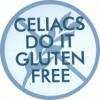-
Welcome to Celiac.com!
You have found your celiac tribe! Join us and ask questions in our forum, share your story, and connect with others.
-
Celiac.com Sponsor (A1):
Celiac.com Sponsor (A1-M):
-
Get Celiac.com Updates:Support Celiac.com!
The Specific Carbohydrate Diet
-
Get Celiac.com Updates:Support Celiac.com:
-
Celiac.com Sponsor (A17):
Celiac.com Sponsor (A17):
Celiac.com Sponsors (A17-M):
-
Recent Activity
-
- Anmol replied to Anmol's topic in Post Diagnosis, Recovery & Treatment of Celiac Disease2
Recently Diagnosed Celiac- Need advice
Thanks this is helpful. Couple of follow -ups- that critical point till it stays silent is age dependent or dependent on continuing to eat gluten. In other words if she is on gluten-free diet can she stay on silent celiac disease forever? what are the most cost effective yet efficient test to track the inflammation/antibodies and see if gluten... -
- trents replied to Anmol's topic in Post Diagnosis, Recovery & Treatment of Celiac Disease2
Recently Diagnosed Celiac- Need advice
Welcome to the community forum, @Anmol! There are a number of blood antibody tests that can be administered when diagnosing celiac disease and it is normal that not all of them will be positive. Three out of four that were run for you were positive. It looks pretty conclusive that you have celiac disease. Many physicians will only run the tTG-IGA test... -
- knitty kitty replied to Nacina's topic in Related Issues & Disorders5
14 year old with Celiac & EOE still suffering...
Forgot one... https://www.hormonesmatter.com/eosinophilic-esophagitis-sugar-thiamine-sensitive/ -
- trents replied to ekelsay's topic in Post Diagnosis, Recovery & Treatment of Celiac Disease1
50 YO Male Recently Diagnosed with Celiac Disease
Welcome to the forum community, @ekelsay! Yes, your tTG-IGA score is strongly positive for celiac disease. There are other antibody tests that can be run when diagnosing celiac disease but the tTG-IGA is the most popular with physicians because it combines good sensitivity with good specificity, and it is a relatively inexpensive test to perform. The... -
- Anmol posted a topic in Post Diagnosis, Recovery & Treatment of Celiac Disease2
Recently Diagnosed Celiac- Need advice
Hello all- my wife was recently diagnosed with Celiac below are her blood results. We are still absorbing this. I wanted to seek clarity on few things: 1. Her symptoms aren't extreme. She was asked to go on gluten free diet a couple years ago but she did not completely cut off gluten. Partly because she wasn't seeing extreme symptoms. Only bloating...
-




Recommended Posts
Archived
This topic is now archived and is closed to further replies.